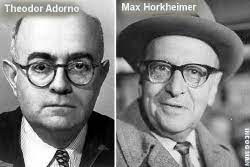вАЬCulture industryвАЭ is the name of the theory that was developed by Theodore Adorno and Max Horkheimer вАУ two German-Jewish philosophers -to explain the production of culture in Western Capitalist societies.¬†
Having grown up in Germany around communist ideology and influence, and later fully emersed in the American capitalist lifestyle at the height of its economic output, these two theorists aimed to explain why people in imperfect capitalist societies, seemed to be fine with the status quo. The conclusion they came to, was that of Culture Industry. They believed that in these capitalist societies, cultural material was industrialised and commodified, like goods from a factory. The mass-production of these cultural materials led to homogenisation, where all these products started to look and feel very similar. This process was aimed at creating passivity and conformity, which was used to manipulate the masses into a false sense of happiness, by distracting them from all the issues that actually existed in society.

In the digital world we now live in, where a large part of our lives and identities exist online, theorists believe mainstream media is one of the primary tools used in capitalists societies to carry out the modern culture industry. Big news outlets, such as BBC, Fox, CNN, and others have incredible power when it comes to controlling news streams, content, and the narrative that is being conveyed to the public on many important topics, where the masses simply just listen and follow suit, with no ability to independently and critically think.
In the digital world we now live in, where a large part of our lives and identities exist online, theorists believe mainstream media is one of the primary tools used in capitalists societies to carry out the modern culture industry. Big news outlets, such as BBC, Fox, CNN, and others have incredible power when it comes to controlling news streams, content, and the narrative that is being conveyed to the public on many important topics, where the masses simply just listen and follow suit, with no ability to independently and critically think.
One of the major criticisms of the theory of culture industry, is that it is very pessimistic in its outlook on society. This theory views the masses as a passive audience, like sheep in a herd, just following the orders of the Shepard. This belief is elitist as it states that the masses, or the average person, is oblivious to reality, and mindlessly goes along with the status quo of the mainstream media. However, with the events that have occurred across the globe in the last few weeks, this theory has been stiffly challenged.
After the events that unfolded regarding Israel and Palestine, the media in the West has pushed a very specific agenda in order to lull the masses back into passivity, and not challenge the decisions of their governments:
However, this is not what has occurred, as people are not just simply going along with the western mediaвАЩs agenda and perspective of these events, but they are actively challenging these narratives, by critically engaging, investigating, and questioning the truth as it is portrayed to them. Protests have erupted across the globe, with many people calling on these media outlets to change their coverage and be more transparent.

Edinburgh, Scotland 
London, England 
Washington, D.C.
If the mainstream media and the culture industry in general, was as powerful as they claim, then why are so many people critically and independently thinking for themselves, instead of staying in a state of passivity and conformity?
Reference list:
Adorno, Th. & Horkheimer, M. (2006). вАШThe Culture Industry: Enlightenment as Mass DeceptionвАЩ. iIn:Durham, M.G. & D. Kellner (2006), Media and Cultural Studies:Key Work, Malden, MA: Blackwell,[pp.41-72] [Accessed: 24 October, 2023]
Cheryl Williams. (2016).¬†Adorno and Horkheimer (1944) вАШThe Culture Industry: Enlightenment as Mass DeceptionвАЩ. [online] Available at: https://cherylwilliams.wordpress.com/2016/06/17/adorno-and-horkheimer-1944-the-culture-industry-enlightenment-as-mass-deception/.
Gulcin Kazan Doger (2023).¬†British journalist accuses Western media of bias in reporting on Israel-Palestine conflict. [online] www.aa.com.tr. Available at: https://www.aa.com.tr/en/europe/british-journalist-accuses-western-media-of-bias-in-reporting-on-israel-palestine-conflict/3019152.вАМ
www.youtube.com. (2023). Protests erupt from coast to coast a week after Hamas attack on Israel. [online] Available at: https://www.youtube.com/watch?v=PsXVxHBOp-I [Accessed 24 Oct. 2023].вАМ
вАМ




First of all, I would like to express my love for the layout of this article! I like the author’s layout of this article very much, which is simple and orderly, with excellent graphics and pictures. Many pictures and videos are used to decorate this chapter. I want to learn from the author. Secondly, the author writes this article with critical thinking and is coherent. To put it into words, one of the reasons why cultural industry theory is criticized is its pessimistic view of society. From where to see, the author will use a specific case to point out. Benefit a lot!рЯСНрЯПїрЯСНрЯПї
This was a really good read. I’m glad that you’ve included links to modern day society and stuff that is relevant today. I’ll be taking notes and using this to improve my work!
Your essay not only has a detailed explanation of cultural products but also the part of cultural products related to modern society. There are many links in the article to help the audience understand better. It also explains the lack of critical thinking in modern society. Your article gave me a lot of inspiration.
Hi! I like how you using video and comment to combine your article. And also connect it to real life example that is happening recently, referencing did prove the accuracy of your article. I might learn from you in my following writings! рЯЩВ